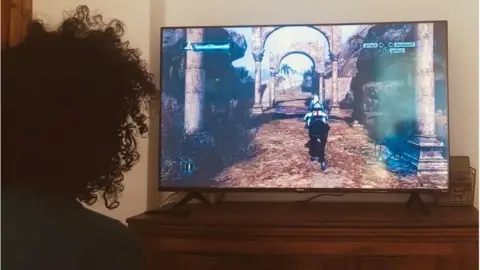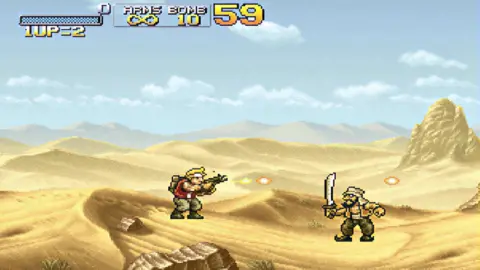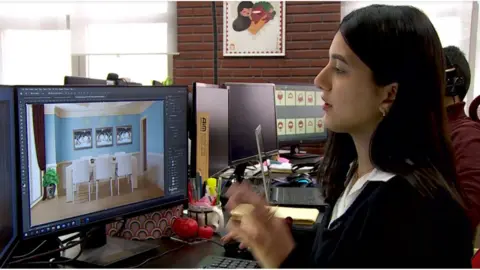The rise of the video game Arab hero
 BBC
BBCA group of young people compete on consoles in an air-conditioned video game cafe on a hot summer's day. A familiar scene in many Arab cities today, as has been the case for the past two decades.
Like many of his peers, this is how Eslam Gamal, a software engineer and a video game enthusiast, spent many hours of his youth in Cairo, Egypt - a city where pubs and bars are lacking.
For Eslam, fun was "reaching a higher score in a game like Metal Slug or working on a mission in a First Person Shooter (FPS) game such as Counter-Strike". Even so, it bothered Eslam that both games portrayed Arabs, including Egyptians, as terrorists and savages, "but never enough to stop playing these games".
Like other entertainment industries, video games have often committed the all-too-familiar mistake of perpetuating stereotypes of Arabs.
Some adopt an older Orientalist view, in which Arab women are belly dancers and men play the flute to charm a snake or are seen atop a camel. Games such as Arabian Fight, Aladdin and the Metal Slug series are examples of this. While they are classic arcade titles, they are regaining popularity with many retro consoles on the market.
Other games, particularly FPS games, adopt the post-9/11 lens that exclusively depicts Arab characters as terrorists.
Surging market
Times are changing, however. As films and TV shows adopt a more global outlook, so are video games, with better representation of Arabs beginning to be seen in mainstream titles.
Altair Ibn-La'Ahad, the main protagonist of the Assassin's Creed series by Ubisoft, is still a Syrian assassin, but he has become an Arab hero.
Playing with an Arab character that is "not exaggerated or ridiculous" has transformed Eslam's gaming experience.
 SNK Playmore
SNK PlaymoreTo Eslam, stereotyping in video games "is not only in the character design, but it is also in how the Arab cities and streets are primitive and desert-like". Many others have a similar experience to Eslam, so Assassin's Creed quickly became popular amongst Arab gamers.
More realistic Arab representation started to appear in popular video games as large studios took notice of the promising Arab market.
According to a report on the gaming market in Asia and the Middle East by consultants Niko Partners, the Arab video game industry was estimated at $1.7bn (£1.4bn) in 2021 with more than 65 million players. It is forecast to reach $3.12bn by 2025.
Other positive depictions of Arab characters followed Altair. Faridah Malik from the Deus Ex series is a skilled pilot and the first recognisable Arab female protagonist in a game.
The Street Fighter franchise has also introduced Rashid as "an easy-going and laid-back person… [the] eldest son of a wealthy Middle Eastern family", while the video game Tekken introduced Zafina, an accomplished female fighter.
Growing localisation
In 2015, Ubisoft, the French studio behind Assassin's Creed, was not the only one tapping into the booming Arab market.
Game studios in countries such as Saudi Arabia and Jordan have started to emerge in the last decade as localisation became more popular.
Assassin's Creed became the first mainstream game to be released fully localised for the Arabic audience.
Ubisoft capitalised on the franchise's popularity in the region and co-operated with native studios to release the game with Arabic speech, subtitles and a localised user interface and menu screens.

"Localisation is not just translating a game, it is changing all aspects of a game, the objects you use, the art of the game, the food, the clothes," says Hossam Hammo, founder of Tamatem Games, a start-up in Amman, Jordan, that localises international video games.
"Imagine that you play a racing game, and the road is your city," he says.
Mr Hammo, a video game enthusiast himself, started his company with the vision "to contribute to the Arabic digital content that is lacking in relation to the large base of Arab users".
Mira Karout, a game developer at Tamatem, is working on localising a new game in preparation for the Islamic holy month of Ramadan.
In keeping with traditions observed during the month, Ms Karout is adding date fruits to tables inside the game, and decorating the rooms with Islamic textiles.
"We get a lot of positive feedback from our users, males and females, who are always happy to be better represented in the games they love," she says.